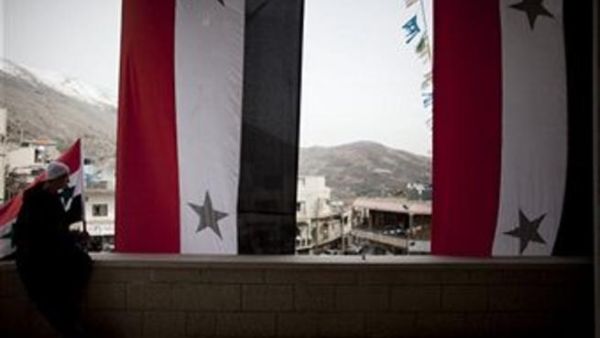Imad Ajam had always managed to find a way around sanctions on Syria, whether by using a proxy to get into blocked websites or buying American electronics routed through Dubai.
But these days the IT professional from Aleppo, who had always been resourceful in light of his country’s international isolation, sees that his options have run dry.
“We’ve been without electricity in the entire city for about two weeks now. We’ve only had a few hours of water too, as it takes electricity to pump water through the city,” he told The Daily Star over Facebook, adding that it was not unusual for hospitals to go for much of the day without power due to the lack of diesel for generators, and some have even stopped their services.
“Sanctions only hurt normal people. The regime doesn’t care, and gets the weapons and fuel for its army from Russia, while the ordinary people suffer from high living costs and outages.”
For Ajam, sanctions are “just a media ploy, to pretend you’re doing something, whereas in reality you’re just making things worse for the people you’re supposed to be helping.”
The U.S. has imposed a vast array of sanctions on Syria, since 1979 when the country designated Syria a state sponsor of terrorism. The most recent and most comprehensive round of pre-uprising sanctions were imposed under the 2003 Syrian Accountability Act, which banned U.S. business investment and property transactions in the country and reduced diplomatic contacts.
Despite a thaw in ties after the Syrian pullout from Lebanon in 2005 and a period of rapprochement under the Bush administration in the U.S., coinciding with a new period of economic reform inside Syria, the Accountability Act, which requires congressional approval for amendments, is still in place.
But the harsh government crackdown on civilian protesters just over two years ago led to much tighter sanctions, this time multilateral.
In theory, sanctions do not prevent the import of refined fuels, but many energy companies have stopped doing business with Syria due to high and complicated compliance costs.
Syrian political analyst Sami Moubayed from Damascus, now a visiting scholar at the Carnegie Institute in Beirut, believes the sanctions were imposed arbitrarily.
“No Syrian could send or receive money in U.S. dollars, nor could Syrians fleeing the destruction in their country open accounts in foreign banks,” he says. “This was crazy ... because the regime did not feel the pain, ordinary Syrians did.”
“Sanctions don’t bring down regimes; the world knows that from Iraq. Sanctions eat away at the nation from within, weakening the regime, no doubt, but at a very high human price.”
In March, U.S. State Department spokeswoman Victoria Nuland said the sanctions imposed on Syria were not targeting its fuel imports, but its exports. At a news conference, she said the sanctions were “designed to avoid putting further suffering on the Syrian people so we don’t target the import of Syrian fuel products from non-U.S. persons.”
U.S. Treasury spokesman John Sullivan told The Daily Star by phone that the sanctions had been designed to target the regime, not regular civilians.
He believes sanctions have been generally successful, pointing out that Damascus has been going through its reserves with its main revenues of oil and tourism having dried up and with the Syrian pound having lost half its value from two years ago.
He adds that the sanctions shouldn’t affect remittances, humanitarian aid or medicine supplies to Syria.
Blame has been exchanged as to why many Syrians are cut off from financial institutions, and possibly worse, aren’t getting adequate fuel or cooking oil. The Syrian government blames the U.S., which in turn says Damascus is hoarding the oil for its war machines.
One thing is certain: The Syrian people are suffering from a lack of this essential commodity resource. Residents say the price of oil has become 10 times what it was two years ago.
“The worst was after the revolution,” says Ajam, who supported the popular uprising in the beginning, before it became an armed conflict. “They canceled all credit cards belonging to Syrians inside Syria and placed sanctions on the oil and fuel, which quite obviously hurt ordinary Syrians the most.”
For those who have the resources to leave Syria, the sanctions can still hurt. In February, HSBC dropped its non-premium Syrian clients (including those living abroad) due to the high compliance costs associated with sanctions.
Mohanad Ghashim, who was running an IT business in Aleppo before resettling in Amman last year, says that when the financial sanctions started in Syria, he was no longer able to get paid by his U.S. clients. “I tried to open a new bank account in Lebanon or Jordan, but it didn’t work, and I had to close my agency and relocate.”
Under U.S. sanctions Syrian graduate students are also barred from taking the GMAT (for business school) and MCAT (for medical school) unless they have resided outside of Syria – a huge impediment for many Syrians “whose only intention is to secure a better future for themselves and their families,” says NGO Jusoor’s Leen al-Zaibak.
More recently, Syrian medical school graduates have been prevented from taking exams for the Educational Commission for Foreign Medical Graduates, which allows their degree to be recognized in the U.S. Moubayed hopes that when there is finally a settlement, sanctions will be swiftly lifted.
“When sanctions are imposed, it becomes very difficult to remove them, by U.S. law. I think that if a political deal is reached ... then one of the conditions for it seeing the light [of day] is the lifting of sanctions the minute the transition period starts,” he said. “It cannot wait until the transition finishes; too much human misery is [taking place].”








